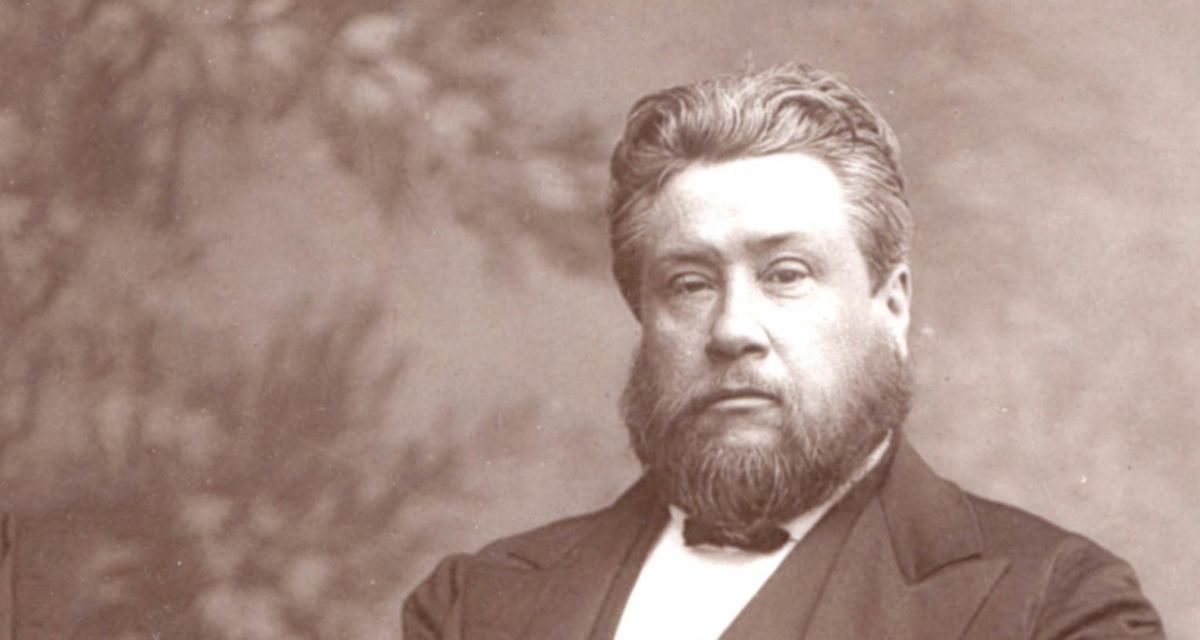Editor’s Note: This was first preached by Charles Haddon Spurgeon in London, and published in 1911, several years after his death.
“But my God shall supply all your need, according to his riches in glory by
Christ Jesus.”
—Philippians 4:19
THE Philippians had several times sent presents to Paul, to supply his necessities. Though they were not themselves rich, yet they made a contribution, and sent Epaphroditus with it, “an odour of sweet smell, a sacrifice acceptable, well pleasing to God.” Paul felt very grateful: he thanked God, but he did not forget also to thank the donors; he wished them, every blessing, and he did as good as say, “You have supplied my need, and my God shall supply yours. You have supplied my need of temporal food and raiment out of your poverty; my God shall supply all your need out of his riches in glory.” “As,” he says, in the eighteenth verse, “I have all and abound: I am full,” “so,” he adds, “‘my God shall supply all your need.’ You have sent what you gave me by the hand of a beloved brother, but God will send a better messenger to you, for he will supply all your need ‘by Christ Jesus.’“ Every single word sounds as if he had thought it over, and the Spirit of God had guided him in his meditation, so that he should to the fullest extent wish them back a blessing similar to that which they had sent to him, only of a richer and more enduring kind.
Now, on this New Year’s Day I would desire, somewhat in the spirit of Paul, to bless those of you who have supplied, according to your abilities, the wants of God’s work in my hands, and have given, even out of your poverty, to the cause of God, according as there has been need. I count myself to be personally your debtor though your gifts have been for the students, and the orphans, and the colporteurs, and not for myself. In return for your kindness, after the manner of his gracious love, “my God shall supply all your need, according to his riches in glory by Christ Jesus.”
This verse is particularly sweet to me, for, when we were building the Orphanage, I foresaw that, if we had no voting, and no collecting of annual subscriptions, but depended upon the goodness of God, and the voluntary offerings of his people, we should have times of trial, and therefore I ordered the masons to place upon the first columns of the Orphanage entrance, these words, “My God shall supply all your need, according to his riches in glory by Christ Jesus.” The text therefore is out in stone upon the right hand and upon the left of the great archway. There stands this declaration of our confidence in God; and as long as God lives, we shall never need be remove it, for he will certainly supply the needs of his own work. While we serve him, he will furnish our tables for us.
- The text might suggest to us a field of gloomy thought, if we wished to indulge the melancholy vein, for it speaks of “all your need.” So, first, behold A GREAT NECESSITY: “all your need.” What a gulf! What an abyss! “All your need.” I do not know how many believers made up the church at Philippi, but the need of one saint is great enough; what must many need? It would not be possible to tell the number of God’s children on earth, but the text comprehends the need of the whole chosen family, “all your need.” We will not ask you to reckon up the wonderful draught upon the divine exchequer which must be made by all the needs of all the saints who are yet on earth: but please think of your own need; that will be more within the compass of your experience and the range of your meditation. May the Lord supply your need and all your need!
There is our temporal need, and that is no little matter. If we have food and raiment, we should be therewith content; but there are many of God’s people to when the mere getting of food and raiment is a wearisome toil; and what with household cares, family trials, sickness of body, losses in business, and sometimes the impossibility of obtaining suitable labor, many of God’s saints are as hard put to it as Elijah was when he sat by the brook Cherith. If God did not send them their bread and meat in a remarkable manner, they would surely starve; but their bread shall be given them, and their water shall be sure. “My God shall supply all your need.” You have, perhaps, a large family, and your needs are therefore greatly increased, but the declaration of the text includes the whole of your needs personal and relative.
After all, our temporal needs are very small compared with our spiritual needs. A man may, with the blessing of God, pretty readily provide for the wants of the body, but who shall provide for the requirements of the soul? There is need of perpetual pardon, for we are always sinning; and Jesus Christ’s blood is always pleading for us, and cleansing us from sin. Every day there is need of fresh strength battle against inward sin; and, blessed be God, it is daily supplied, so that our youth is renewed  like the eagle’s. As good soldiers of Jesus Christ, we need armor from head to foot, and even then we do not know how to wear the armor, or how to wield the sword, unless he who gave us these sacred implements shall be always with us. Warring saint, God will supply all your need by his presence and Spirit. But we are not merely warriors, we are also workers. We are called, many of us, to important spheres of labor, (and, indeed, let no man think his sphere unimportant,) but here also our hands shall be sufficient for us, and we shall accomplish our life-work. You have need to be helped to do the right thing, at the right time, in the right spirit, and in the right manner; your need, as a Sunday-school teacher, as an open-air preacher, and especially as a minister of the gospel, will be very great; but the text meets all your requirements, “My God shall supply all your need.” Then comes our need in suffering, for many of us are called to take our turn in the Lord’s prison-house. Here we need patience under pain, and hope under depression of spirit. Who is sufficient for furnace-work? Our God will supply us with those choice graces and consolations which shall strengthen us to glorify his name even in the fires. He will either make the burden lighter, or the burden stronger; he will diminish the need, or increase the supply.
like the eagle’s. As good soldiers of Jesus Christ, we need armor from head to foot, and even then we do not know how to wear the armor, or how to wield the sword, unless he who gave us these sacred implements shall be always with us. Warring saint, God will supply all your need by his presence and Spirit. But we are not merely warriors, we are also workers. We are called, many of us, to important spheres of labor, (and, indeed, let no man think his sphere unimportant,) but here also our hands shall be sufficient for us, and we shall accomplish our life-work. You have need to be helped to do the right thing, at the right time, in the right spirit, and in the right manner; your need, as a Sunday-school teacher, as an open-air preacher, and especially as a minister of the gospel, will be very great; but the text meets all your requirements, “My God shall supply all your need.” Then comes our need in suffering, for many of us are called to take our turn in the Lord’s prison-house. Here we need patience under pain, and hope under depression of spirit. Who is sufficient for furnace-work? Our God will supply us with those choice graces and consolations which shall strengthen us to glorify his name even in the fires. He will either make the burden lighter, or the burden stronger; he will diminish the need, or increase the supply.
Beloved, it is impossible for me to mention all the forms of our spiritual need. We need to be daily converted from some sin or other, which, perhaps, we have scarcely known to be sin. We need to be instructed in the things of God, we need to be illuminated as to the mind of Christ, we need to be comforted by the promises, we need to be quickened by the precepts, we need to be strengthened by the doctrines. We need, oh, what do we not need? We are just a bag of wants, and a heap of infirmities. If any one of us were to keep a want-book, as I have seen tradesmen do, what a huge folio it would need to be; and it might be written within and without, and crossed and re-crossed, for we are full of wants from the first of January to the end of December; but here is the mercy, “My God shall supply all your need.” Are you put in high places? Have you many comforts? Do you enjoy wealth? What need you have to be kept from loving the world, to be preserved from wantonness and pride, and the follies and fashions of this present evil world. My God will supply your need in that respect. Are you very poor? Then the temptation is to envy, to bitterness of spirit, to rebellion against God. “My God shall supply all your need.” Are you alone in the world? Then you need the Lord Jesus to be your Companion; and, your Companion he will be. Have you many around you? Then you have need of grace to set them a good example, to bring up your children, and manage your household in the fear of God.” My God shall supply all your need.” You have need, in times of joy, to be kept sober and steady; you have need, in times of sorrow, to be strong and quit yourselves like men; you have needs in living, and you will have needs in dying, but your last need shall be supplied as surely as your first. “My God shall supply all your need.”
Come, then, brethren, and look down into this great gulf of need, and exultingly say, “O Lord, we thank thee that our needs are great, for there is the more room for thy love, thy tenderness, thy power, thy faithfulness, to fill the chasm.”
That first thought, which I said might be a gloomy one, has all the dreariness taken out of it by four others equally true, but each of them full of good cheer. The text not only mentions a great necessity, but it mentions also a great Helper: “My God;” next, a great supply: “My God shall supply all your need;” thirdly, an abundant store out of which to draw the gift: “according to his riches in glory;” and lastly, a glorious channel through which the supply shall come: “by Christ Jesus.”
- So, for our enormous wants here is A GREAT HELPER: My God shall supply all your need.”
Whose God is that? Why, Paul’s God. That is one of the matters in which the greatest saints are no better off than the very least, for though Paul called the Lord “My God,” he is my God too. My dear old friend who sits yonder, and has nothing but a few pence in all the world, can also say, “and he is my God too. He is my God, and he is as much my God if I am the meanest, most obscure, and weakest of his people, as he would be my God if I were able, like Paul, to evangelize the nations.” It is, to me, delightful to think that my God is Paul’s God, because, you see, Paul intended this; he meant to say, “You see, dear brethren, my God has supplied all my wants; and as he is your God, he will supply yours.” I have been in the Roman dungeon in which Paul is said to have been confined, and a comfortless prison indeed it is. First of all you descend into a vaulted chamber, into which no light ever comes except through a little round hole in the roof; and then, in the middle of the floor of that den, there is another opening, through which the prisoner was let down into a second and lower dungeon, in which no fresh air or light could possibly come to him. Paul was probably confined there. The dungeon of the Praetorium in which he was certainly immured is not much better. Paul would have been left well nigh to starve there, but for those good people at Philippi. I should not wonder but what Lydia was at the bottom of this kind movement, or else the jailer. They said, “We must not let the good apostle starve;” and so they made up a contribution, and send him what he wanted; and when Paul received it he said, “My God has taken care of me. I cannot make tents here in this dark place so as to earn my own living, but my Master still supplies my need; and even so, when you are in straits, will he supply you.”
“My God.” It has often been sweet to me, when I have thought of my orphan children, and money has not come in, to remember Mr. Müller’s God, and how he always supplied the children at Bristol. His God is my God, and I rest upon him. When you turn over the pages of Scripture, and read of men who were in sore trouble, and were helped, you may say, “Here is Abraham, he was blessed in all this, and Abraham’s God will supply all my need, for he is my God. I read of Elijah, that the ravens fed him; I have Elijah’s God, and he can command the ravens to feed me if he pleases.” The God of the prophets, the God of the apostle, the God of all the saints that have gone before us, “this God is our God for ever and ever.” It seems to be thought by some that God will not work now as he used to die. “Oh, if we had lived in miraculous times,” they say, “then we could have trusted him! Then there was manifest evidence of God’s existence, for he pushed aside the laws of nature, and wrought for the fulfillment of his promises to his people.” Yet that was a rather coarser mode of working than the present one, for now the Lord produces the same results without the violation of the laws of nature. It is a great fact that, without the disturbance of a single law of nature, prayer becomes effectual with God; and God being enquired of by his people to do it for them, does fulfill his promise, and supply their needs. Using means of various kinds, he still gives his people all things necessary for this life and godliness. Without a miracle, he works great wonders of loving care, and he will continue so to do.
Beloved, is the God of Paul your God? Do you regard him as such? It is not every man who worships Paul’s God. It is not every professing Christian who really knows the Lord at all, for some invent a deity such as they fancy God ought to be. The God of Paul is the God of the Old and New Testament,-such a God as we find there. Do  you trust such a God? Can you rest upon him?” There are such severe judgments mentioned in Scripture.” Yes, do you quarrel with them? Then you cast him off; but if, instead thereof, you feel, “I cannot understand thee, O my God, nor do I think I ever shall, but it is not for me, a child, to measure the infinite God, or to arraign thee at my bar, and say to thee, ‘Thus shouldst thou have done, and thus oughtest thou not to have done.’ Thou sayest, ‘ Such am I,’ and I answer, ‘ Such as thou art, I love thee, and I cast myself upon thee, the God of Abraham, of Isaac, and of Jacob, the God of thy servant Paul. Thou art my God, and I will rest upon thee.’“ Very well, then, he will “supply all your need, according to his riches in glory by Christ Jesus.” Just think of that for a minute.
you trust such a God? Can you rest upon him?” There are such severe judgments mentioned in Scripture.” Yes, do you quarrel with them? Then you cast him off; but if, instead thereof, you feel, “I cannot understand thee, O my God, nor do I think I ever shall, but it is not for me, a child, to measure the infinite God, or to arraign thee at my bar, and say to thee, ‘Thus shouldst thou have done, and thus oughtest thou not to have done.’ Thou sayest, ‘ Such am I,’ and I answer, ‘ Such as thou art, I love thee, and I cast myself upon thee, the God of Abraham, of Isaac, and of Jacob, the God of thy servant Paul. Thou art my God, and I will rest upon thee.’“ Very well, then, he will “supply all your need, according to his riches in glory by Christ Jesus.” Just think of that for a minute.
If he will supply you, you will be supplied indeed, for God is infinite in capacity. He is indefinitely wise as to the manner of his actions; and infinitely powerful as to the acts themselves. He never sleeps nor tires; he is never absent from any place, but is always ready to help. Your needs come, perhaps, at very unexpected times; they may occur in the midnight of despondency or in the noonday of delight, but God is ever near to supply the surprising need. He is everywhere present and everywhere omnipotent, and he can supply all your need, in every place, at every time, to the fullest degree.
“Remember that Omnipotence has servants everywhere;”
-and that, whenever God wishes to send you aid, he can do it without pausing to ask, “How shall it be done?” He has but to will it, and all the powers of heaven and earth are subservient to your necessity. With such a Helper, what cause have you to doubt?
III. The next point in the text is, A GREAT SUPPLY. “My God shall supply all your need.”
Sometimes, we lose a good deal of the meaning of Scripture through the translation; in fact, nothing ever does gain by translation except a bishop. The present passage might be rendered thus “My God will fill to the full all your need.” The illustration which will best explain the meaning is that of the woman whose children were to be sold by her creditor to pay the debts of her late husband. She had nothing to call her own except some empty oil-jars, and the prophet bade her set these in order, and bring the little oil which still remained in the cruse. She did so, and he then said to her, “Go among your neighbours, and borrow empty vessels, not a few.” She went from one to another till she had filled her room full of these empty vessels, and then the prophet said, “Pour out.” She began to pour out from her almost empty cruse; and, to her surprise, it filled her largest oil-jar. She went to another, and filled that, and then another and another. She kept on filling all the oil-jars, till at last she said to the prophet, “there is not a vessel more.” Then the oil stayed, but not till then. So will it be with your needs. You were frightened at having so many needs just now, were you not? But now be pleased to think you have them, for they are just so many empty vessels to be filled. If the woman had borrowed only a few jars, she could not have received much oil; but the more empty vessels she had, the more oil she obtained. So, the more wants and the more needs you have if you bring them to God, so much the better, for he will fill them all to the brim, and you may be thankful that there are so many to be filled. When you have no more wants, (but oh, when will that be?) then the supply will be stayed, but not till then.
How gloriously God gives to his people! We wanted pardon once: he washed us, and he made us whiter than snow. We wanted clothing, for we were naked. What did he do? Give us some rough dress or other? Oh, no! but he said, “Bring forth the best robe, and put it on him.” It was a fortunate thing for the prodigal that, his clothes were all in rags, for then he needed raiment, and the best robe was brought forth. It is a grand thing to be sensible of spiritual needs, for they will all be supplied. A conscious want in the sight of God,-what is it but a prevalent request for a new mercy? We have sometimes asked him to comfort us, for we were very low; but when the Lord has comforted us, he has so filled us with delight that we have been inclined to cry with the old Scotch divine, “Hold, Lord, hold! It is enough. I cannot bear more joy. Remember I am only an earthen vessel.” We, in relieving the poor, generally give no more than we can help, but our God does not stop to count his favours, he gives like a king. He pours water upon him that is thirsty, and floods upon the dry ground.
- We must pass on to the next thought, and consider for a minute or two THE GREAT RESOURCES out of which this supply is to come: “My God shall supply all your need, according to his riches in glory.” The preacher may sit down now, for he cannot compass this part of the text. God’s riches in glory are beyond all thought.
Consider the riches of God in nature; who shall count his treasures? Get away into the forests; travel on league after league among the trees which cast their ample shade for no man’s pleasure, but only for the Lord. Mark on lone mountain-side and far-reaching plain the myriads of flowers whose perfume is for God alone. What wealth each spring and summer is created in the boundless estates of the great King! Observe the vast amount of animal and insect life which crowds the land with the riches of divine wisdom, for “the earth is the Lord’s, and the fullness thereof.” Look towards the sea; think of those shoals of fish, so countless that, when only the fringe of them is touched by our fishermen, they find enough food to supply a nation. Mark, too, the sunken treasures of the ocean, which no hand gathereth but that of the Eternal. If you would see the wealth of the Creator, cast your eye to the stars; tell ye their numbers if ye can. Astronomy has enlarged our vision, and made us look upon this world as a mere speck compared with innumerable other worlds that God has made; and it has told us that, probably, all the myriads of worlds that we can see with the telescope are a mere fraction of the countless orbs which tenant infinite space. Vast are God’s riches in nature. It needs a Milton to sing, as he sang in Paradise Lost, the riches of the creating God.
The riches of God in providence are equally without bound. He saith to this creature, “Go,” and he goeth, and to another, “Do this,” and he doeth it, for all things do his bidding. Think of the wealth of God in grace. There nature and providence stand eclipsed, for we have the fountain of eternal love, the gift of an infinite sacrifice, the pouring out of the blood of his own dear Son, and the covenant of grace in which the smallest blessing is infinite in value. The riches of his grace! “God is rich in mercy,”-rich in patience, love, power, kindness, rich beyond all conception.
Now your needs shall be supplied according to the riches of nature, and the riches of providence, and the riches of grace; but this is not all; the apostle chooses a higher style, and writes “according to his riches in glory.” Ah, we have never seen God in glory! That were a sight our eyes could none at present behold. Christ in his glory, when transfigured upon earth, was too resplendent a spectacle even for the tutored eyes of Peter, and James, and John.
“At the too-transporting light,”-darkness rushed upon them, and they were as men that slept What God is in his glory do ye know, ye angels? Does he not veil his face even from you lest, in the excessive brightness of his essence, even you should be consumed? Who amongst all his creatures can tell the riches of his glory, when even the heavens are not pure in his sight, and he charges his angels with folly?
“His riches in glory.” It means not only the riches of what he has done, but the riches of what he could do; for if he has made hosts of worlds, he could make as many myriads more, and then have but begun. The possibilities of God omnipotent, who shall reckon? But the Lord shall supply all your need according to such glorious possibilities. When a great king gives according to his, riches, then he does not measure out stinted alms to beggars, but he gives like a king, as we say; and if it be some grand festival day, and the king is in his state array, his largesse is on a noble scale. Now, when God is in his glory, bethink you, if you can, what must be the largesse that he distributes,-what the treasures that he brings forth for his own beloved! Now, “according to his riches in glory,” he will supply all your needs. After that, dare you despond? O soul, what insanity is unbelief? What flagrant blasphemy is doubt of the love of God! He must bless us; and, blessed by him, we must be blest indeed. If he is to supply our needs “according to his riches in glory,” they will be supplied to the full.
- Now let us close our meditation by considering THE GLORIOUS CHANNEL by which these needs are to be supplied: “According to his riches in glory by Christ Jesus.”
You shall have all your soul’s wants satisfied, but you must go to Christ for everything. “By Christ Jesus.” That is the fountainhead where the living waters well up. You are not to keep your wants supplied by your own care and fretfulness. “Consider the lilies, how they grow.” You are to be enriched “by Christ Jesus.” You are not to have your spiritual wants supplied by going to Moses, and working and toiling as if you were your own saviour, but by faith in Christ Jesus. Those who will not go to Christ Jesus must go without grace, for God will give them nothing in the way of grace except through his Son. Those who go to Jesus the most shall oftenest taste of his abundance, for through him all blessings come. My advice to myself and to you is that we abide in him; for, since that is the way by which the blessing comes, we had better abide in it. We read of Ishmael that he was sent into the wilderness with a bottle, but Isaac dwelt by the well Lahai-roi, and it is wise for us to dwell by the well Christ Jesus, and never trust to the bottles of our own strength. If you wander from Christ Jesus, brother, you depart from the center of bliss.
All this year I pray that you may abide by the well of this text. Draw from it. Are you very thirsty? Draw from it, for it is full; and when you plead this promise, the Lord will supply all your need. Do not cease receiving from God for a minute. Let not your unbelief hinder the Lord’s bounty, but cling to this promise, “My God shall supply all your need, according to his riches in glory by Christ Jesus.” I know not how to wish “you a greater blessing. If you are enabled by the Holy Spirit to realize it, you will enjoy what I earnestly wish for you, namely,
-A HAPPY NEW YEAR.










5